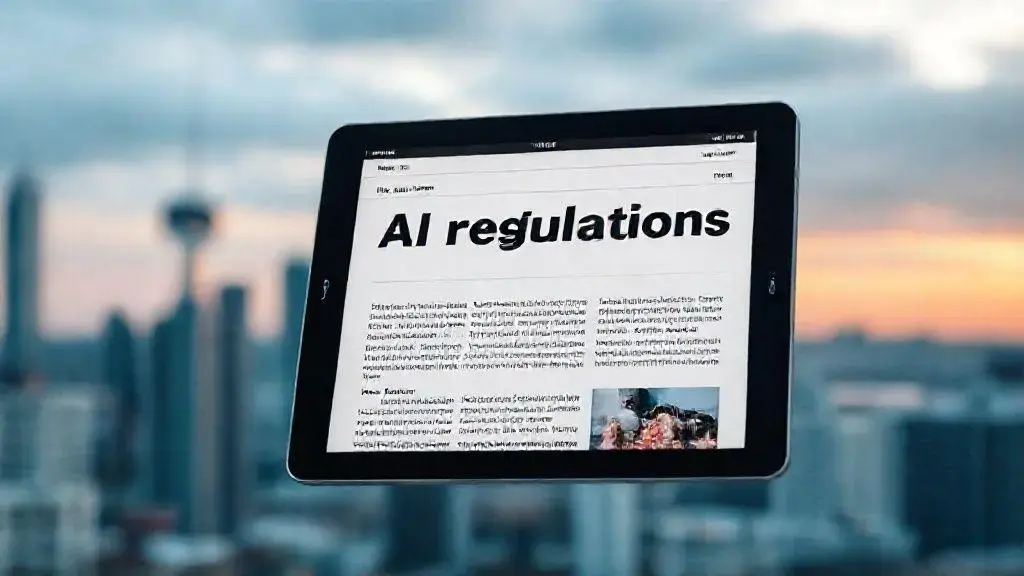A i regulation news: what’s changing and why it matters

AI governance involves establishing ethical, transparent, and responsible frameworks for the development and use of artificial intelligence, emphasizing accountability, public engagement, and global cooperation.
The field of a i regulation news is evolving rapidly, and it’s crucial to keep up with these changes. Have you ever wondered how new rules can impact technology and innovation? Let’s explore these shifts together.
Understanding AI regulations
Understanding AI regulations is essential in today’s technology-driven world. With the rapid growth of artificial intelligence, governments are stepping in to ensure that these technologies are safe and ethical.
Various nations are adopting regulations to manage the use of AI. These laws help protect consumers and promote fair practices. One significant aspect is the need for transparency in AI systems. Companies must disclose how their algorithms work, especially if they impact people’s lives.
Key Principles of AI Regulations
AI regulations often revolve around several fundamental principles:
- Accountability: Companies are responsible for the outcomes of their AI systems.
- Fairness: AI should not discriminate against individuals or groups.
- Privacy: Regulations protect personal data from misuse.
- Safety: AI technologies must be tested to prevent harm.
Another important element is the idea of oversight. Governments might establish regulatory bodies to ensure compliance with these rules. This oversight can lead to better public trust in AI technologies.
With these regulations in place, businesses can innovate more freely, knowing they operate within a well-defined legal framework. This understanding paves the way for a balanced approach, fostering technological advancement while protecting society.
Future of AI Regulations
As AI evolves, so will its regulations. Ongoing discussions among stakeholders will help shape the future landscape of AI governance. Keeping an eye on these developments is crucial for anyone involved in technology.
Key changes in AI policies
Key changes in AI policies are shaping the future of technology worldwide. As the importance of artificial intelligence grows, governments are updating their laws to address emerging challenges.
One main focus is on data privacy. New rules require companies to be more transparent about how they collect and use personal information. This shift aims to protect users and build trust in AI systems.
Impact of Algorithm Transparency
Another vital change is the push for algorithm transparency. Companies must reveal how their algorithms make decisions. This transparency helps ensure that AI systems are fair and accountable.
- Ethical Use: AI must be used responsibly and without bias.
- Monitoring: Ongoing oversight of AI tools is crucial.
- Consumer Protection: New policies aim to protect users from harmful AI practices.
Regulations are also adapting to address issues such as bias in AI. Businesses need to actively work against discrimination in their AI systems. This means regularly testing algorithms and correcting any biases found.
Furthermore, international cooperation is becoming increasingly important. Countries are beginning to share best practices and establish global standards for AI governance. Such collaborations will help create a more unified approach to addressing the challenges posed by AI technologies.
Future Directions for AI Policies
As we look ahead, more changes in AI policies are expected. Lawmakers will likely further refine rules to accommodate rapid technological advancements. Keeping up with these developments is essential for businesses aiming to thrive in this evolving landscape.
The impact of AI regulations on businesses

The impact of AI regulations on businesses is profound. As new rules emerge, companies must adapt to keep up with the changing landscape of technology and compliance.
One major effect is the need for businesses to prioritize data privacy. Companies are now required to implement stricter measures to protect sensitive information from misuse. Failure to comply can lead to hefty fines and reputational damage.
Cost of Compliance
Compliance with AI regulations often comes with significant costs. Businesses may need to invest in updated technologies and training programs. This includes hiring specialized staff to manage compliance issues and ensure ethical use of AI.
- Technology Upgrades: Companies must invest in systems that meet regulatory standards.
- Employee Training: Staff need to understand new policies and how to apply them.
- Legal Consultation: Many businesses require legal advice to navigate complex regulations.
Moreover, regulations can also drive innovation. Companies that meet these standards often develop improved AI solutions. This can result in better products and services, enhancing customer satisfaction and trust.
As businesses strive to comply with regulations, they also find opportunities for growth. Meeting high standards can set a company apart in a competitive market. Moreover, organizations that embrace ethical practices may earn a positive reputation, attracting more customers.
Challenges Ahead
Despite these benefits, adapting to AI regulations can be challenging. The fast pace of technological advancements often outstrips the legislative process. Therefore, businesses must stay informed about changes and be ready to adjust policies and practices quickly.
Global perspectives on AI regulation
Global perspectives on AI regulation are varied and complex. Different countries have unique approaches to governing artificial intelligence. As technology evolves, so do the strategies nations implement to manage its impact.
For instance, in Europe, the focus is on establishing strict guidelines to ensure ethical AI use. The European Union has proposed a comprehensive framework that emphasizes transparency and accountability. These regulations aim to protect citizens’ rights and promote trust in AI systems.
United States Approach
In contrast, the United States tends to favor a more flexible regulatory environment. The emphasis is on fostering innovation while addressing ethical concerns. Various federal agencies are exploring how to develop guidelines that support growth in the AI sector without stifling creativity.
- Innovation-Driven: US policies often prioritize technological advancement.
- Sector-Specific Regulations: Different industries may have tailored rules for AI.
- Collaboration with Private Sector: The government often collaborates with tech companies for input on regulations.
Meanwhile, Asia shows a different approach. Countries like China are rapidly advancing AI technologies while implementing strict regulations focused on national security and data privacy. This ensures that AI developments align with government goals and maintain social stability.
As nations navigate the complexities of AI regulation, collaboration is essential. International dialogues and agreements can help harmonize policies across borders, leading to a more cohesive global approach. Engaging in joint efforts will address shared challenges and ensure a balanced evolution of AI technologies.
Future Directions
The future of AI regulation will likely be shaped by ongoing discussions across nations. As AI technologies continue to evolve, so must the regulations that govern them. Keeping an eye on these global trends will be crucial for companies involved in AI development and implementation.
Future trends in AI governance
Future trends in AI governance are crucial as technology continues to advance rapidly. As artificial intelligence becomes more integrated into daily life, the need for strong governance structures is increasingly important.
One emerging trend is the emphasis on ethical AI development. Stakeholders are pushing for guidelines that prioritize ethical considerations. This includes ensuring that AI systems do not perpetuate bias or harm vulnerable populations.
Increased Transparency
Another key trend is the demand for increased transparency in AI operations. Companies are being asked to disclose more about how their algorithms work. This transparency can help build trust among users and regulators alike.
- Accountability: Organizations need to take responsibility for AI decisions.
- Public Engagement: Involving the public in discussions about AI regulations is gaining traction.
- Standardization: Developing common standards will help harmonize AI practices globally.
We can also expect a rise in collaborative governance models. Countries and regions will likely come together to create unified approaches to AI governance. This collaboration can address cross-border challenges and ensure consistent regulatory practices.
As we look forward, technological advancements will continue to influence AI governance. For instance, the integration of blockchain technology might offer solutions for enhancing accountability and traceability in AI systems. These innovations could potentially create new frameworks for managing AI applications while maintaining security.
Global Cooperation
Global cooperation is essential as AI technologies do not respect borders. International agreements and partnerships will be key to effectively governing AI. Organizations like the United Nations are stepping in to facilitate discussions on AI governance standards worldwide.
In conclusion, the future of AI governance is bright but requires careful consideration. As we move forward, ethical practices, increased transparency, and global cooperation will be vital. By collaborating and engaging with stakeholders, we can ensure that AI technologies develop in ways that benefit society while addressing critical challenges. Staying informed about trends in AI regulations will help businesses navigate this evolving landscape effectively.
FAQ – Frequently Asked Questions about AI Governance
What is the main focus of AI governance?
The main focus of AI governance is to ensure that artificial intelligence is developed and used ethically, transparently, and responsibly.
Why is transparency important in AI systems?
Transparency is important because it helps build trust among users and ensures accountability for AI decisions being made.
How can global cooperation benefit AI regulation?
Global cooperation can create unified standards for AI governance, addressing cross-border challenges and ensuring consistent practices.
What role does ethics play in AI development?
Ethics play a crucial role in shaping policies and practices that prevent bias and promote fair treatment in AI applications.





